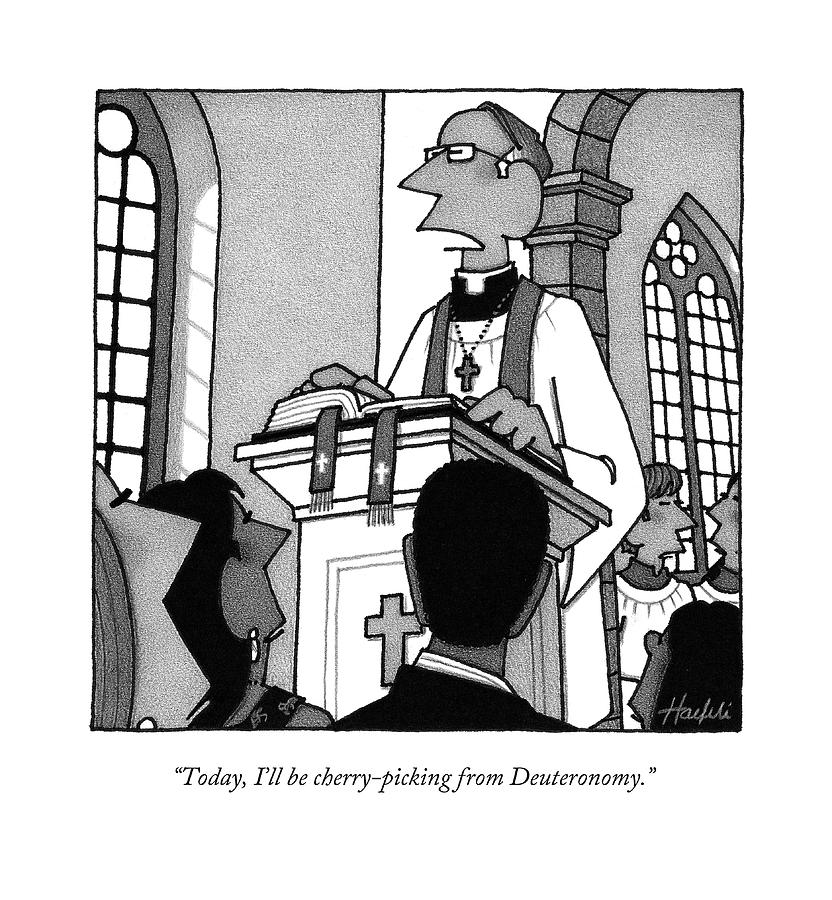Arguing morality with theists
Moderators: kiore, Blip, The_Metatron
•
26 posts
• Page 1 of 2 • 1, 2
Arguing morality with theists
I haven't posted here in a while. I'm arguing morality with a theist on r/atheism. He basically says that God is unchanging and what is moral or immoral, thus morality is unchanging and, apparently objective, as God is immune to subjective influences. The problem with this is that he doesn't know (can justify) that God is an unchanging, objective being. He just believes that he does. If we are talking about the biblical god, it's very subjective, filled with human biases, emotions, and favoritism. He also thinks that if morality is subjective, we can't say what's good and bad on whatever is accepted at the time. Utterly fucking foolish. Look at slavery for a counterexample. You may also want to look at animal abuse and child abuse. These aren't moral any more thanks to the people who fought against such things and given very good reasons for us not to do them. We understand more about the human condition now and our morality has changed because of that.
https://www.reddit.com/r/atheism/commen ... _religion/
https://www.reddit.com/r/atheism/commen ... _religion/
- Mr. Skeptic
- THREAD STARTER
- Posts: 146

Re: Arguing morality with theists
How about this: once upon a time it was okay to slaughter and rape other tribes. In fact, it was a direct command of God. Now it is an international war crime.
Once upon a time it was okay, and even a requirement, to kill a disobedient child.
Once upon a time it was okay, and even a requirement, to force a woman to marry her rapist, or if she refused, kill her
Once upon a time it was okay to enslave people. Furthermore, it was okay to rape your slaves; their offspring would also be your slaves
Once upon a time it was okay, and even a requirement, to kill homosexual men.
Once upon a time it was abomination to eat pork, or shellfish, to get a tattoo, to wear clothing with mixed fibers, cut off sideburns.
Your average Christian would say that the above-mentioned rules were for the Jews attempting to follow the Law. And that Jesus' death and resurrection "fulfilled the Law" and Christian need no longer follow those rules. This of course is the very definition of Moral Relativism. The Morals are not Absolute, they have in fact Changed, even by a Christian's own understanding.
Once upon a time it was okay, and even a requirement, to kill a disobedient child.
Once upon a time it was okay, and even a requirement, to force a woman to marry her rapist, or if she refused, kill her
Once upon a time it was okay to enslave people. Furthermore, it was okay to rape your slaves; their offspring would also be your slaves
Once upon a time it was okay, and even a requirement, to kill homosexual men.
Once upon a time it was abomination to eat pork, or shellfish, to get a tattoo, to wear clothing with mixed fibers, cut off sideburns.
Your average Christian would say that the above-mentioned rules were for the Jews attempting to follow the Law. And that Jesus' death and resurrection "fulfilled the Law" and Christian need no longer follow those rules. This of course is the very definition of Moral Relativism. The Morals are not Absolute, they have in fact Changed, even by a Christian's own understanding.
-

scott1328 - Name: Some call me... Tim
- Posts: 8849


Re: Arguing morality with theists
I would mostly try to take down the idea that God is an unchanging character. While some bible passages do say that God is unchanging, this is in direct conflict if the above statement is true. Another being that God is somehow not a subjective being. He's arguing from God's nature apparently, which is good. This is a really big problem for the theist in question, as anything that God does, moral or immoral, would be moral by definition as it is in God's nature to be good. This includes completely immoral actions such as genocide and slavery. It also creates tautologies.
Another criticism I got was that I was objectifying the moral statement "suffering is less preferable" or "lesser suffering over greater suffering". I'm not at all. It is a fact that I feel pain and that pain is a part of my self-preservation as an organism. I'm not claiming that it is in fact moral to avoid suffering or because it is in the world and causes, but it is our goal to reduce unnecessary suffering and procreate wellbeing. I'm not derving oughtness from isness. The problem is that gods are creations of humans. They are the product of human minds. I'm not aware of any sort of god that was not or could not be influenced by humans or other sapient minds. If gods are defined as objective. that doesn't mean anything. All that is a definition; behind which is subjective motives.
Another criticism I got was that I was objectifying the moral statement "suffering is less preferable" or "lesser suffering over greater suffering". I'm not at all. It is a fact that I feel pain and that pain is a part of my self-preservation as an organism. I'm not claiming that it is in fact moral to avoid suffering or because it is in the world and causes, but it is our goal to reduce unnecessary suffering and procreate wellbeing. I'm not derving oughtness from isness. The problem is that gods are creations of humans. They are the product of human minds. I'm not aware of any sort of god that was not or could not be influenced by humans or other sapient minds. If gods are defined as objective. that doesn't mean anything. All that is a definition; behind which is subjective motives.
- Mr. Skeptic
- THREAD STARTER
- Posts: 146

Re: Arguing morality with theists
You should look at Matt Dillahunty's videos. In a few of them, when debating this very topic, he raises the problem of slavery.
It usually goes down like this :
MD : The Bible advocates slavery.
Caller : No it doesn't.
MD : Yes it does (reads the verses in question, especially Exodus 21)
Caller : It was different then
MD : is it moral to own another human being ?
Caller : pathetic excuse as to why God allows it.
MD : hangs up on him/her.
There has been at least one case where a woman, when asked "would you be my slave, under the rules defined in the Bible ?", simply answered "Yes".
Sometimes they argue "that's the OT". That's bullshit, the NT says nothing about slavery, let alone corrects it.
Sometimes they say "It was OK then", which is a direct contradiction to the unchanging god.
Some even try to make a distinction between African taken from their countries as slaves, and making war prisonners slaves, as the Bible advocates.
Slavery was never moral. The fact that it was accepted by some during a time doesn't make it moral. And seeing so many believers incapable of admitting this simple fact, just because it's written in their fairy tale book is sickening.
It usually goes down like this :
MD : The Bible advocates slavery.
Caller : No it doesn't.
MD : Yes it does (reads the verses in question, especially Exodus 21)
Caller : It was different then
MD : is it moral to own another human being ?
Caller : pathetic excuse as to why God allows it.
MD : hangs up on him/her.
There has been at least one case where a woman, when asked "would you be my slave, under the rules defined in the Bible ?", simply answered "Yes".
Sometimes they argue "that's the OT". That's bullshit, the NT says nothing about slavery, let alone corrects it.
Sometimes they say "It was OK then", which is a direct contradiction to the unchanging god.
Some even try to make a distinction between African taken from their countries as slaves, and making war prisonners slaves, as the Bible advocates.
Slavery was never moral. The fact that it was accepted by some during a time doesn't make it moral. And seeing so many believers incapable of admitting this simple fact, just because it's written in their fairy tale book is sickening.
- aban57
- Name: Cindy
- Posts: 7501
- Age: 44

- Country: France

Re: Arguing morality with theists
aban57 wrote:
Slavery was never moral. The fact that it was accepted by some during a time doesn't make it moral. And seeing so many believers incapable of admitting this simple fact, just because it's written in their fairy tale book is sickening.
This statement implies a moral absolute and is self-defeating.
I am afraid that the sad truth is that at one time, Slavery, was once a universal and moral practice. There was an entire ethos built around the institution throughout many cultures.
Fortunately, slavery is now universally reviled as immoral. And our modern attitudes toward the practice demonstrates just how relative Morality is.
-

scott1328 - Name: Some call me... Tim
- Posts: 8849


Re: Arguing morality with theists
scott1328 wrote:aban57 wrote:
Slavery was never moral. The fact that it was accepted by some during a time doesn't make it moral. And seeing so many believers incapable of admitting this simple fact, just because it's written in their fairy tale book is sickening.
This statement implies a moral absolute and is self-defeating.
No it doesn't. It just means that what is moral and what is accepted at a certain time are not the same thing.
We base our morality on roughly 3 things : empathy, reciprocity (the golden rule is at least 4000 years old) and boundaries (my freedom ends where other people's starts). But the will to act morally has never been universally shared. it's becoming more prevalent with time, as we get rid of those against it, mainly dictators and religions.
- aban57
- Name: Cindy
- Posts: 7501
- Age: 44

- Country: France

Re: Arguing morality with theists
Pure morality must be boundless, by meaningful-rational default. Any other reference to it is hence meaningless (subjective). As is yours, evidently.
Il messaggero non e importante.
Ora non e importante.
Il resultato futuro e importante.
Quindi, persisto.
Ora non e importante.
Il resultato futuro e importante.
Quindi, persisto.
- jamest
- Posts: 18934

- Country: England

Re: Arguing morality with theists
WTF is “boundless” mean? Patent nonsense.
"Walla Walla Bonga!" — Witticism
-

felltoearth - Posts: 14762
- Age: 56

Re: Arguing morality with theists
Your theist wrote:It's a weak argument as Christianity isn't primarly a religion of "law and order", but about relating to god and therefor to everyone and everything else in a way that is "good". The term "good" is a keyphrase that is important for christian ethics, as "good" is identified with god. That's why christian ethic is "objectiv", because what's good is set in stone and isn't affected by cultural or other subjective influences.
Ehh. What are "subjective influences"? Because views like divine command theory and theological voluntarism are quite literally about what God commands or wills. You need better thought through distinctions than these if you want to map out where different views sit. And considering one or two views in isolation risks you later putting various other views into categories where they clearly don't belong.
When the straight and narrow gets a little too straight, roll up the joint.
Or don't. Just follow your arrow wherever it points.
Kacey Musgraves
Or don't. Just follow your arrow wherever it points.
Kacey Musgraves
-

Spinozasgalt - RS Donator
- Name: Jennifer
- Posts: 18787
- Age: 37

- Country: Australia

Re: Arguing morality with theists
felltoearth wrote:WTF is “boundless” mean? Patent nonsense.
It's like he doesn't eve try to be coherent.
- aban57
- Name: Cindy
- Posts: 7501
- Age: 44

- Country: France

Re: Arguing morality with theists
jamest wrote:Pure morality must be boundless, by meaningful-rational default. Any other reference to it is hence meaningless (subjective). As is yours, evidently.
Has to be one of the most inane attempts I've ever seen, and that's even coming from the perspective of it being as pointless to discuss morality with theists as it is pointless to discuss differential equations with a 3 year old; neither are equipped to deal with the respective topics.
If nothing else at all, then morality is concerned with the distinction between right and wrong, ergo there's necessarily a boundary between the two, or there is no such thing as morality.
I'm not an atheist; I just don't believe in gods :- that which I don't belong to isn't a group!
Religion: Mass Stockholm Syndrome
Learn Stuff. Stuff good. https://www.coursera.org/
Religion: Mass Stockholm Syndrome
Learn Stuff. Stuff good. https://www.coursera.org/
-

Spearthrower - Posts: 33854
- Age: 48

- Country: Thailand
Re: Arguing morality with theists
jamest wrote:Pure morality must be boundless, by meaningful-rational default. Any other reference to it is hence meaningless (subjective). As is yours, evidently.
That's not how morality works. Any sort of morality is inevitably subjective, which makes the whole distinction utterly meaningless. The best "objective" moral system of ethics would be pragmatic ethics, only dealing with what is, not what should be done. The only should or ought in such a system is the beliefs you would hold in order to do good. moral action and to disregard beliefs that are not moral or are bad (eg. false beliefs about reality such as egoism, medical denialism, and alt-med). That's what makes it pragmatic; it's about beliefs, which guide actions, actions have consequences, and consequences are objective.
- Mr. Skeptic
- THREAD STARTER
- Posts: 146

Re: Arguing morality with theists
Spinozasgalt wrote:Your theist wrote:It's a weak argument as Christianity isn't primarly a religion of "law and order", but about relating to god and therefor to everyone and everything else in a way that is "good". The term "good" is a keyphrase that is important for christian ethics, as "good" is identified with god. That's why christian ethic is "objectiv", because what's good is set in stone and isn't affected by cultural or other subjective influences.
Ehh. What are "subjective influences"? Because views like divine command theory and theological voluntarism are quite literally about what God commands or wills. You need better thought through distinctions than these if you want to map out where different views sit. And considering one or two views in isolation risks you later putting various other views into categories where they clearly don't belong.
Another aspect that he seems to ignore is subjective influences on his religion and his god. I pointed out this to him, but he simply dismissed my answer with "well thats not the case of Islam, Judaism, or Christianity." Um. Yes, it is. These religions aren't all that special, regardless of what you think of them.
- Mr. Skeptic
- THREAD STARTER
- Posts: 146

Re: Arguing morality with theists
scott1328 wrote:aban57 wrote:
Slavery was never moral. The fact that it was accepted by some during a time doesn't make it moral. And seeing so many believers incapable of admitting this simple fact, just because it's written in their fairy tale book is sickening.
This statement implies a moral absolute and is self-defeating.
I am afraid that the sad truth is that at one time, Slavery, was once a universal and moral practice. There was an entire ethos built around the institution throughout many cultures.
Fortunately, slavery is now universally reviled as immoral. And our modern attitudes toward the practice demonstrates just how relative Morality is.
It seems to me that systems of morality in different societies tend to be a fairly fluid mix of hardwired, relative to circumstances, and idiosyncratic?
We’ve evolved to cooperate closely and flexibly, and morality seems to be central: functioning human societies operate by setting up rules and ganging up on individuals who break those rules. To the extent that the function of morality (which enabled it to evolve through natural selection of chance mutations) is to enable humans to work together effectively in groups, it is at least constrained by our biology and circumstances. For example, in the poor and highly stratified societies of two or three millennia ago, the poorer people were probably not much better off than slaves and slavery was an acceptable institution, while in much wealthier modern democracies, slavery would be an anomaly?
A basic feature of human morality, which is I think seen in all functioning societies, is that third parties will often intervene to prevent bullying, unprovoked assaults are seen as wrong. By contrast, helpfulness is seen as good. This kind of response may be hardwired, as shown, for example, by Paul Bloom’s work on preverbal babies which prefer helpful puppets over unhelpful ones (a 2011 lecture by Paul Bloom is here). Interestingly, a similar experiment has recently been carried out on bonobos, and they steadily preferred the unhelpful characters, perhaps because they were seen as having higher status (a brief article about the paper is here, the original paper is here). This evidently hardwired difference between humans and bonobos may be a crucial factor in our social behaviour (admittedly, the human helpfulness is often limited to people of our own group). Quoting the bonobo article linked above:
DURHAM, N.C. -- Never trust anyone who is rude to a waiter, advice columnists say. For most people, acting nasty is a big turnoff.
But while humans generally prefer individuals who are nice to others, a Duke University study finds bonobos are more attracted to jerks.
The researchers were surprised by the findings because these African apes -- our closest relatives in the animal kingdom along with chimpanzees -- have been shown to be less aggressive than chimps.
The results support the idea that a tendency to avoid individuals who mistreat others is one of the things that make humans different from other species.
Even infants as young as three months old show an ability to distinguish nice guys from creeps, and prefer interacting with people they see helping others over those who are mean, previous studies show.
To find out if our closest relatives share the same social bias, Duke’s Brian Hare, an associate professor of evolutionary anthropology, and doctoral student Christopher Krupenye studied adult bonobos at Lola ya Bonobo Sanctuary in the Democratic Republic of Congo.
In one series of trials, they showed 24 bonobos animated videos of a Pac-Man-like shape as it struggles to climb a hill. Then another cartoon shape enters the scene. Sometimes it’s a helpful character who gives the Pac-Man a push to the top, and other times it’s an unhelpful one who shoves him back down.
Afterwards, the researchers offered the bonobos two pieces of apple, one placed under a paper cutout of the helpful character and another under the unhelpful one, and gauged the bonobos’ preference by watching to see which one they reached for first.
In another experiment, the bonobos watched a skit in which a human actor drops a stuffed animal out of reach. Then another person tries to return the toy to its rightful owner, but before they can a third person snatches it away. Afterwards, the bonobos choose whether to accept a piece of apple from the do-gooder or the thief.
In each experiment, the bonobos were able to distinguish between helpful and unhelpful individuals just like humans can. But unlike humans, most bonobos tended to choose the jerks.
The researchers also measured the apes’ baseline preferences for each of the people in the stuffed animal skit at the beginning of the experiment, before the drama with the toy unfolded. The bonobos liked the mean people even more after they started behaving badly.
The researchers say there may be a good reason for these puzzling results. It could be that bonobos interpret rudeness as a sign of social status and are simply trying to keep dominant individuals on their side. In other words, it pays to have powerful allies.
To test the idea, the team showed 24 bonobos another set of animated videos in which one cartoon character repeatedly prevents another one from claiming a coveted spot. The apes generally preferred the character who hogged the spot over the one who yielded.
For bonobos, schmoozing with dominant individuals could mean better access to food, mates or other perks, or less chance of being bullied themselves, Krupenye said.
The fact that bonobos prefer bullies and humans don’t suggests that an aversion to jerks is a fundamental aspect of human behavior that may be unique to our branch of the primate family tree.
In humans, the thinking goes, shunning wrongdoers not only helps people avoid bad partners, but also discourages wrongdoers from behaving badly in the first place. The threat of social rejection keeps them in check.
Scientists say this bias may be what enables humans to work together in large numbers -- even with complete strangers -- in ways that other species do not.
“Humans might have this unique preference for helpers that is really at the heart of why we’re so cooperative,” said Krupenye, now a postdoctoral fellow at the University of St Andrews in Scotland.
This post is only tangentially relevant to the OP. I think that evolutionary theory and experimental evidence do show that there’s an inbuilt element to morality; religion isn’t essential and there’s no need to think of morality as going against natural selection.
-

zoon - Posts: 3302
Re: Arguing morality with theists
Mr. Skeptic wrote:Spinozasgalt wrote:Your theist wrote:It's a weak argument as Christianity isn't primarly a religion of "law and order", but about relating to god and therefor to everyone and everything else in a way that is "good". The term "good" is a keyphrase that is important for christian ethics, as "good" is identified with god. That's why christian ethic is "objectiv", because what's good is set in stone and isn't affected by cultural or other subjective influences.
Ehh. What are "subjective influences"? Because views like divine command theory and theological voluntarism are quite literally about what God commands or wills. You need better thought through distinctions than these if you want to map out where different views sit. And considering one or two views in isolation risks you later putting various other views into categories where they clearly don't belong.
Another aspect that he seems to ignore is subjective influences on his religion and his god. I pointed out this to him, but he simply dismissed my answer with "well thats not the case of Islam, Judaism, or Christianity." Um. Yes, it is. These religions aren't all that special, regardless of what you think of them.
Yeah, there's actually a big literature even in philosophy on this, because God's knowledge of contingent things and creatures can't be what we what we take knowledge to be on a typical picture (where it creates change in, or otherwise affects, the knower) without threatening his impassibility.
When the straight and narrow gets a little too straight, roll up the joint.
Or don't. Just follow your arrow wherever it points.
Kacey Musgraves
Or don't. Just follow your arrow wherever it points.
Kacey Musgraves
-

Spinozasgalt - RS Donator
- Name: Jennifer
- Posts: 18787
- Age: 37

- Country: Australia

Re: Arguing morality with theists
jamest wrote:Pure morality must be boundless, by meaningful-rational default. Any other reference to it is hence meaningless (subjective). As is yours, evidently.
There is no such thing as pure morality. There is morality, and it is contingent on the social environment in which it is situated. Even the much vaunted "Do unto others..." has always had boundaries. For instance, historically speaking, what constitutes "others" has always been subject to exclusions.
Additionally, I cannot find any doctrine, be it religious or secular, that manages to be both universally consistent and independent in its practical application from social conditions in time and place.

God is the mysterious veil under which we hide our ignorance of the cause. - Léo Errera
God created the universe
God just exists
God created the universe
God just exists
-

Hermit - Name: Cantankerous grump
- Posts: 4927
- Age: 70

Re: Arguing morality with theists
Nonsense. Morality is only ever subjective when one individual distinguishes themselves from another. In other words, an absolute/boundless morality is perfectly objective so long as one does not distinguish themselves from anything else, an attitude perfectly compatible with my philosophy as a whole.
Il messaggero non e importante.
Ora non e importante.
Il resultato futuro e importante.
Quindi, persisto.
Ora non e importante.
Il resultato futuro e importante.
Quindi, persisto.
- jamest
- Posts: 18934

- Country: England

Re: Arguing morality with theists
Objective morality is when you're good to yourself.
*eats a Snickers which is also me* Ahh, objective morality.
*eats a Snickers which is also me* Ahh, objective morality.
When the straight and narrow gets a little too straight, roll up the joint.
Or don't. Just follow your arrow wherever it points.
Kacey Musgraves
Or don't. Just follow your arrow wherever it points.
Kacey Musgraves
-

Spinozasgalt - RS Donator
- Name: Jennifer
- Posts: 18787
- Age: 37

- Country: Australia

Re: Arguing morality with theists
jamest wrote:
Nonsense. Morality is only ever subjective when one individual distinguishes themselves from another. In other words, an absolute/boundless morality is perfectly objective so long as one does not distinguish themselves from anything else, an attitude perfectly compatible with my philosophy as a whole.
You don't have a philosophy, and even if you did, that wouldn't decree how all the other people in the world are obliged to consider any subject. Thus the only 'nonsense' here is your self-delusion.
I'm not an atheist; I just don't believe in gods :- that which I don't belong to isn't a group!
Religion: Mass Stockholm Syndrome
Learn Stuff. Stuff good. https://www.coursera.org/
Religion: Mass Stockholm Syndrome
Learn Stuff. Stuff good. https://www.coursera.org/
-

Spearthrower - Posts: 33854
- Age: 48

- Country: Thailand
Re: Arguing morality with theists
Pure fabloolah must be picalictravious. By travbadij-chrublictic sparub. Any other reference to it is hence lastrecluphibian (jedebat). As is yours, evidently.
She battled through in every kind of tribulation,
She revelled in adventure and imagination.
She never listened to no hater, liar,
Breaking boundaries and chasing fire.
Oh, my my! Oh my, she flies!
She revelled in adventure and imagination.
She never listened to no hater, liar,
Breaking boundaries and chasing fire.
Oh, my my! Oh my, she flies!
-

Fallible - RS Donator
- Name: Alice Pooper
- Posts: 51607
- Age: 51

- Country: Engerland na na

26 posts
• Page 1 of 2 • 1, 2
Who is online
Users viewing this topic: No registered users and 1 guest